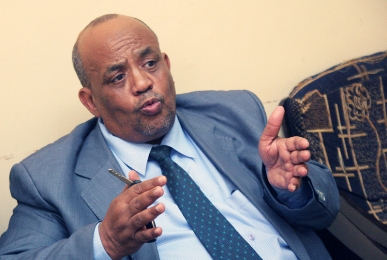Turabi’s party decides to sever contacts with ruling NCP in River Nile State
March 11, 2017 (KHARTOUM) – Sudan’s opposition Popular Congress Party (PCP) of the late Islamist leader Hassan al-Turabi has decided to cut off contacts with the ruling National Congress Party (NCP) in the River Nile State following the arrest of a leading party member.

In a statement extended to Sudan Tribune Saturday, PCP in the River Nile State accused the NISS of disturbing the political atmosphere and ignoring the national dialogue and its outcome, saying they took a set of measures to confront the situation.
“Accordingly, it was decided to sever all forms of communication with the NCP and state organs that bring us together with it and our partners in the public concern” read the statement.
The statement pointed that the NISS is seeking to mobilise the public opinion in order to maintain its powers which the national dialogue decided to restrict to collection and analysis of information.
It added that the NISS sought to defend its powers and ignored its national responsibilities, saying the security agency went on to arrest anyone who criticises its actions.
The PCP further underscored its commitment to the national dialogue, saying it would keep its contacts with all political forces to coordinate efforts to implement the recommendation of the dialogue and on top of it “human freedom and dignity”.
It is noteworthy that the PCP splinted from the NCP since 1999, and joined the opposition ranks since that time but it supported the national dialogue process declared by President Omer al-Bashir in 2014 and participated in all its forums. Also, the party decided to join the upcoming government of national concord led by the NCP.
In January, the Sudanese presidency deposited new amendments to the 2005 transitional constitution with the parliament providing to restrict the powers of the security services and to guarantee political freedoms.
The amendments contained in the “Freedoms’’ document are part of constitutional reforms endorsed by the National Dialogue Conference to reduce NISS influence and limits its role to the gathering and analysis of information.
The new amendments propose that the role of the NISS be reduced to the collection of information and to not be able to detain someone without an arrest warrant issued by a judge. Also, it ends press confiscation and censorship.
However, in an open defiance to the amendments, the director-general of the NISS Mohamed Atta Al-Moula last week vowed to develop the “soft and hard powers” of his agency.
He stressed that the NISS will not concede its main powers but will expand it and be more powerful.
Also, NISS deputy director Osama Mukhtar last month voiced his opposition to any attempt to curtail the power of the security agency and called to enhance its powers to fight the threats that the country is facing.
(ST)
